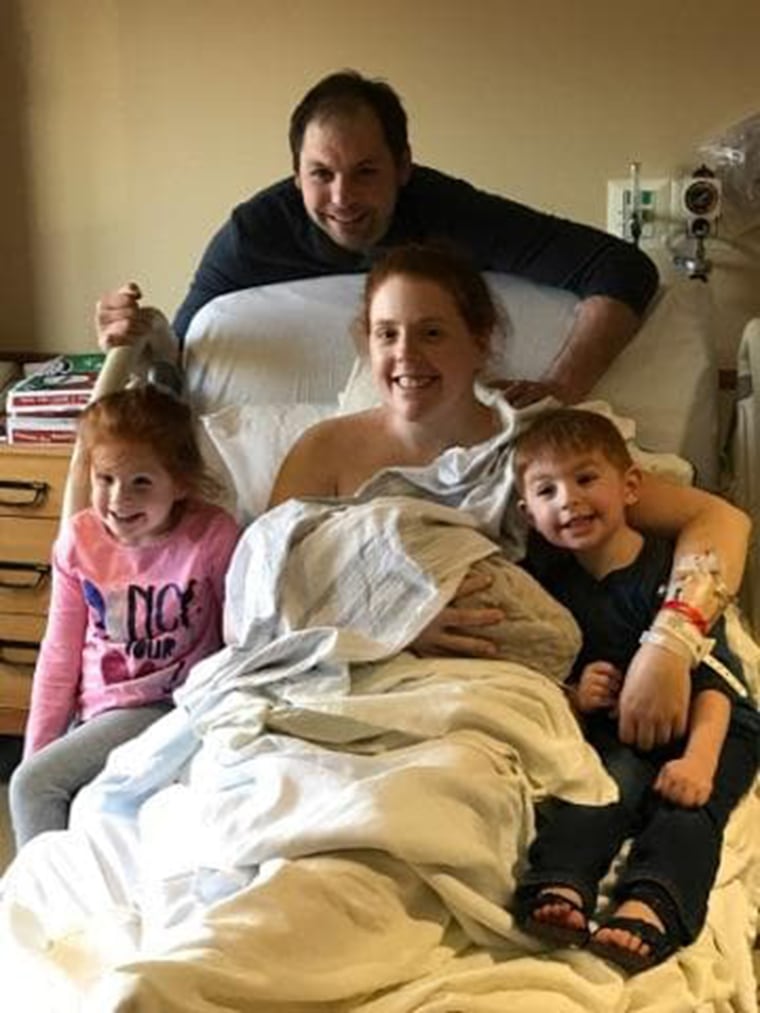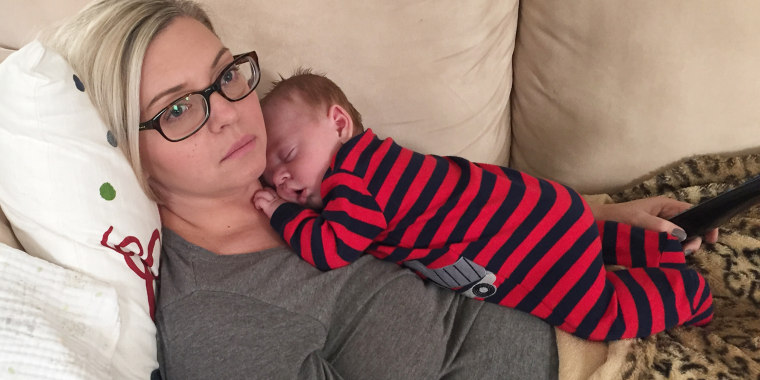Heather King’s first delivery was challenging. It took several days for her labor to progress and by the time baby Payton arrived, both were exhausted and had infections. King was happy Payton was healthy, but she also experienced loads of unexpected emotions.
The new mom felt nervous all the time. She couldn’t sleep. She never allowed her husband to drive with Payton; she was too worried they might be hurt. When her maternity leave ended, she kept calling in sick because she felt paralyzed by fear. When she talked to her doctors, they said everything she was experiencing was normal.
“I was (written) off because I was a new mom,” King, 30, of Lawrenceburg, Kentucky, told TODAY. “My doctor said, ‘You know, you’re a mom now. All moms worry.’”

King’s instincts told her it was more than just new mom nerves, and she switched doctors.
“My new doctor said, ‘No, that is not normal. It is not normal to lose sleep or not let your husband drive because you’re afraid he will be in a terrible accident,’” King recalled.
King has postpartum anxiety. While awareness of postpartum depression has increased in recent years, few understand that the postpartum period can include several disorders, including anxiety, obsessive compulsive disorder or psychosis. This is exactly why some are urging a change in terminology from "postpartum depression" to "perinatal mood and anxiety disorders."
“Even the term 'postpartum depression' is a bit of a misnomer because we know it actually starts in the third trimester,” Dr. Priya Gopalan, chief of psychiatry at UPMC Magee-Womens Hospital in Pittsburgh, told TODAY. “What ends up happening is we pigeonhole people into postpartum depression. ... That really is going to miss a proportion of women.”
Gopalan said that anywhere from 15 percent to 20 percent of women have postpartum depression, and almost the same percentage of women have postpartum anxiety. Some women experience both at the same time. While medications, such as selective serotonin reuptake inhibitors (SSRIs), can help with depression, women with other conditions aside from depression feel they are being overlooked.
“There is a movement in the patient advocacy community, which is very important, to change the terminology,” Samantha Meltzer-Brody, director of the Perinatal Psychiatry Program at UNC Center for Women’s Mood Disorders, told TODAY. “A lot of people think that 'postpartum depression' is too restrictive.”
King agreed.
“No one mentions that you might not even like the baby,” she said. “We talk a lot about the birth but not what it is like when you get home.”
Understanding perinatal mental health
Currently, the Diagnostic and Statistical Manual of Mental Disorders (DSM–5), a manual by the American Psychiatric Association that experts use to diagnose mental illness, only includes "postpartum depression" as a subset of depression. The manual doesn’t include postpartum anxiety, obsessive compulsive disorder, psychosis or perinatal mood and anxiety disorders.
“Some patients are saying, ‘PPD is not capturing what I am feeling,’” Meltzer-Brody explained. “But, it is a challenge because there is no such thing in the DSM-5 as ‘perinatal mood and anxiety disorders.’”
This means some clinicians and insurance companies don’t recognize perinatal mood and anxiety disorders. Using this term instead of "postpartum depression" might cause an insurer to deny treatment or cause a family medicine doctor to misunderstand a patient.
“You would like to have consensus,” Meltzer-Brody said. “It is an important place to start.”
But that doesn’t mean women should be silent about what they're experiencing. Programs addressing perinatal mental health during pregnancy are becoming more common. Meltzer-Brody said patients specifically visit the program at UNC because of its comprehensive look at maternal mental health.
“Having pregnant and postpartum women engaged in these conversations, and being educated that postpartum mental health is one of the greatest complications of childbirth, will push the field forward,” Meltzer-Brody said.
Increasing awareness
Michelle Maggio and her husband were married for a decade before they had their baby boy, Enzo. After having him, she felt stunned by what she was feeling. She had heard of postpartum depression, but she experienced something different: excessive worry. Her anxiety was so intense that she had a hard time eating.
“When my husband would get ready for work, that was when the worst anxiety hit because I would be there alone with the baby,” Maggio, 37, of Pittsburgh, told TODAY. “I had to take care of him and I didn’t want to. I didn’t bond with him.”
Maggio asked for help, and doctors prescribed medication and intensive therapy.
“I couldn’t feel like this anymore,” she said. “There is no way I could have sat and suffered in silence. I would have killed myself.”
Now that her son is 16 months old, Maggio feels so much better. She's raising awareness of postpartum depression and anxiety through the Alexis Joy Foundation, a nonprofit dedicated to helping women deal with mental health issues as well as pregnancy and infant loss. While she thinks a more inclusive name like "perinatal mood and anxiety disorders" might help women, she said being open makes the biggest difference.
“It needs to be talked about," Maggio said. "Moms need to not feel like they have to be perfect and do it all.”
WHERE TO FIND HELP
Find more information and resources on the Postpartum Support International website, www.postpartum.net. They have a 24-hour, national hotline: 1-800-944-4773. Call it and within two hours you can get a call or text back from a trained volunteer who can help.
If you're having thoughts about suicide or feel like you might harm yourself, please call the National Suicide Prevention Lifeline at 1-800-273-TALK (8255).
Help is out there, and you can get better.
Related video:
